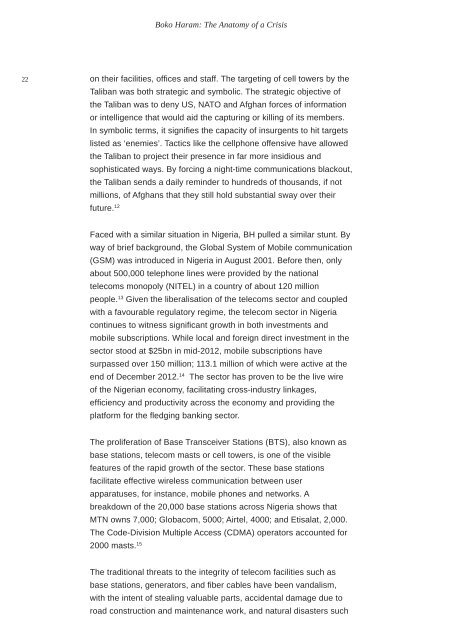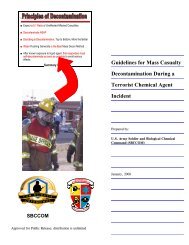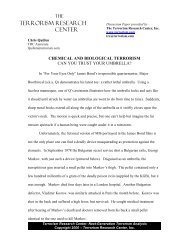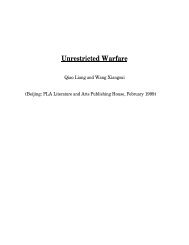Boko Haram Anatomy of a Crisis - Terrorism
Boko Haram Anatomy of a Crisis - Terrorism
Boko Haram Anatomy of a Crisis - Terrorism
You also want an ePaper? Increase the reach of your titles
YUMPU automatically turns print PDFs into web optimized ePapers that Google loves.
<strong>Boko</strong> <strong>Haram</strong>: The <strong>Anatomy</strong> <strong>of</strong> a <strong>Crisis</strong><br />
<strong>Boko</strong> <strong>Haram</strong>’s Attacks on Telecommunication Infrastructure<br />
22 on their facilities, <strong>of</strong>fices and staff. The targeting <strong>of</strong> cell towers by the<br />
Taliban was both strategic and symbolic. The strategic objective <strong>of</strong><br />
the Taliban was to deny US, NATO and Afghan forces <strong>of</strong> information<br />
or intelligence that would aid the capturing or killing <strong>of</strong> its members.<br />
In symbolic terms, it signifies the capacity <strong>of</strong> insurgents to hit targets<br />
listed as ‘enemies’. Tactics like the cellphone <strong>of</strong>fensive have allowed<br />
the Taliban to project their presence in far more insidious and<br />
sophisticated ways. By forcing a night-time communications blackout,<br />
the Taliban sends a daily reminder to hundreds <strong>of</strong> thousands, if not<br />
millions, <strong>of</strong> Afghans that they still hold substantial sway over their<br />
future. 12<br />
Faced with a similar situation in Nigeria, BH pulled a similar stunt. By<br />
way <strong>of</strong> brief background, the Global System <strong>of</strong> Mobile communication<br />
(GSM) was introduced in Nigeria in August 2001. Before then, only<br />
about 500,000 telephone lines were provided by the national<br />
telecoms monopoly (NITEL) in a country <strong>of</strong> about 120 million<br />
people. 13 Given the liberalisation <strong>of</strong> the telecoms sector and coupled<br />
with a favourable regulatory regime, the telecom sector in Nigeria<br />
continues to witness significant growth in both investments and<br />
mobile subscriptions. While local and foreign direct investment in the<br />
sector stood at $25bn in mid-2012, mobile subscriptions have<br />
surpassed over 150 million; 113.1 million <strong>of</strong> which were active at the<br />
end <strong>of</strong> December 2012. 14 The sector has proven to be the live wire<br />
<strong>of</strong> the Nigerian economy, facilitating cross-industry linkages,<br />
efficiency and productivity across the economy and providing the<br />
platform for the fledging banking sector.<br />
The proliferation <strong>of</strong> Base Transceiver Stations (BTS), also known as<br />
base stations, telecom masts or cell towers, is one <strong>of</strong> the visible<br />
features <strong>of</strong> the rapid growth <strong>of</strong> the sector. These base stations<br />
facilitate effective wireless communication between user<br />
apparatuses, for instance, mobile phones and networks. A<br />
breakdown <strong>of</strong> the 20,000 base stations across Nigeria shows that<br />
MTN owns 7,000; Globacom, 5000; Airtel, 4000; and Etisalat, 2,000.<br />
The Code-Division Multiple Access (CDMA) operators accounted for<br />
2000 masts. 15<br />
The traditional threats to the integrity <strong>of</strong> telecom facilities such as<br />
base stations, generators, and fiber cables have been vandalism,<br />
with the intent <strong>of</strong> stealing valuable parts, accidental damage due to<br />
road construction and maintenance work, and natural disasters such<br />
as flooding. However, targeted attacks on this critical infrastructure<br />
by members <strong>of</strong> BH is now a major threat to the operation <strong>of</strong> the<br />
sector.<br />
In July 2011, President Goodluck Jonathan revealed his<br />
administration’s plans under the purview <strong>of</strong> the National Security<br />
Adviser (NSA) to make telecommunications operators dedicate<br />
emergency toll-free lines to the public to fast-track its intelligence<br />
gathering on the sect. 16 On 14 February 2012, a BH spokesman, Abul<br />
‘Qaqa’, threatened that the group will attack GSM service providers<br />
and Nigeria Communication Commission (NCC) <strong>of</strong>fices for their<br />
alleged role in the arrest <strong>of</strong> their members. As he puts it: ‘we have<br />
realised that the mobile phone operators and the NCC have been<br />
assisting security agencies in tracking and arresting our members by<br />
bugging their lines and enabling the security agents to locate the<br />
position <strong>of</strong> our members’. 17<br />
The sect made good its threat on September 2012, when it launched<br />
a two-day coordinated attack on telecom masts belonging to several<br />
telecom operators across five cities in northern Nigeria: Bauchi,<br />
Gombe, Maiduguri, Kano, and Potiskum. A statement purportedly<br />
issued by the BH spokesman, Abul Qaqa, admitted responsibility for<br />
the bombing <strong>of</strong> telecommunication facilities, claiming that they<br />
launched ‘the attacks on masts <strong>of</strong> mobile telecom operators as a<br />
result <strong>of</strong> the assistance they <strong>of</strong>fer security agents’. BH has mounted<br />
several such attacks, mostly targeting base stations. Attacks on<br />
telecom facilities add a new dimension to the pre-existing security<br />
challenges, as entire base stations are destroyed with IEDs, suicide<br />
bombers and other incendiary devices.<br />
Overall in 2012, some 530 base stations were damaged in Nigeria.<br />
While 380 were destroyed by floods that affected many communities<br />
in many states <strong>of</strong> the federation, 150 were damaged in northern<br />
Nigeria by BH. 18 Like the Taliban in Afghanistan, the strategic<br />
objective <strong>of</strong> BH attacks on telecom infrastructure is to choke one <strong>of</strong><br />
the supply lines <strong>of</strong> intelligence to Nigeria’s intelligence and security<br />
system. However, when terrorists or insurgents successfully attack<br />
critical telecommunication infrastructure, it generates costs that could<br />
be assessed from different angles depending on the nature and<br />
criticality <strong>of</strong> such a facility to the economy and security. The BH<br />
attacks on base stations have generated at least three dimensions <strong>of</strong><br />
‘costs’, namely:<br />
23







